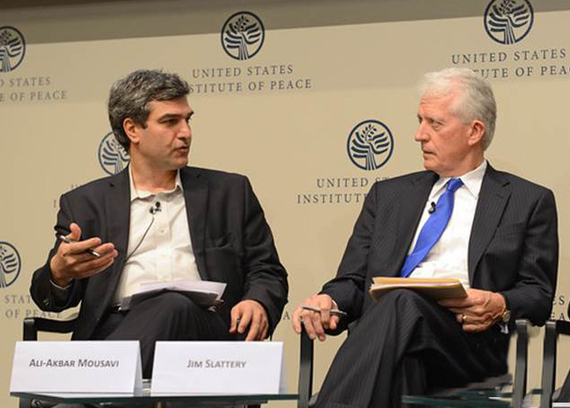Co-authored by Ali Akbar Mousavi: a former member of the Iranian parliament (2000-2004) and a notable Iranian human rights & digital freedom advocate. He was an active member of the Tahkim Vahdat, a prodemocracy student organization, and made a significant attempt to defend the rights of political prisoners during the 1990s. Mousavi currently resides in the US.
In a panel at the United States Institute of Peace, Ali-Akbar Mousavi raises awareness of negative impact of economic sanctions on Iran civil society and also encourages the U.S to seal the deal with Iran. On his left is former Representative Jim Slattery (D-KS), the first United States elected official who has been invited to speak in Iran since 1979.
Among the Iranian-American diaspora, it is indeed fashionable to serve as human rights activists, democracy advocates, and supporters of freedom of expression. And yet such individuals have rarely defined themselves as peacemakers and mediators between their former and current homelands. A meaningful discourse is needed to prioritize this neglected and trivialized aspect of the diaspora's outlook. With the breakthrough that has been achieved in the U.S-Iran nuclear talks, it is high time for the Iranian diaspora to serve as peacemakers and mediators.
The urgent question facing the Iranian-American diaspora concerns the U.S -Iran conflict. How does the diaspora respond to conflict between the two countries? Are they peace-breakers or peace-makers? Diaspora members can act as peace-breakers because of their lobbying, advocating sanctions, demonizing either their homeland or hostland, destabilizing engagement attempts and promoting extremist political views. However; they can also act as peace-makers in mediation and reconstruction efforts by raising awareness of the situation, organizing demonstrations for their cause, humanizing adversaries, upholding peaceful engagement principles, and supporting pro-peace organizations and parties. This means that, diasporas can play varied roles in conflict as a powerful actor in international politics.
A good example of this is the Irish diaspora. Irish emigrants have a long-standing history of investment in the culture and politics of Ireland, even years after they've left the motherland. Not only has the diaspora maintained active engagement in the ongoing conflicts of Northern Ireland, but Irish Americans have also done their part to help navigate avenues to resolution and peace in Ireland as well. In fact, the Good Friday Agreement of 1998 was one result of a campaign spearheaded by prominent Irish-American leaders who managed to shift the diaspora's support away from the militant Irish Republican Army and toward a more civil political process.
One key element of this swing in the direction of amicable conflict resolution was the transition of support of major Irish-American organizations from NORAID to ANIA. While NORAID was responsible for funding the most extreme factions within the Irish republican movement, ANIA represented a different faction of the diaspora -- one that understood that the violence promoted by the Provisional IRA wouldn't be able to win over hearts and minds. Instead, it became clear that the best strategy was to bolster the moderates in the SDLP and Sinn Féin while advocating for peace.
ANIA was able to lobby President Clinton after highlighting the issue of obtaining a visa for Gerry Adams and then utilizing this as a springboard to promote Adams' new way of thinking. The resulting shift in the Irish-American diaspora subsequently helped facilitate a push away from the uncompromising radicals that up until that point had been dominating Ireland's political landscape. On the opposite end of the spectrum, diaspora groups can act as spoilers of peace processes. For instance, the Cuban American National Foundation has steadily called for continued pressure on Cuba via U.S economic sanctions. Despite disagreement regarding the U.S embargo by numerous politicians and business groups, The Cuban American National Foundation has succeeded in persuading lawmaker to maintain pressure on Cuba in the form of sanctions in order to restore democracy and protect human rights. The effect has been to sustain and intensify the blockade for over fifty years, when it might have been relaxed or ended decades ago.
The Cuban example demonstrates that the assertion of human rights is often at odds with attempts to halt conflict. It is unfortunate that the advocacy of human rights and the practice of conflict resolution (both admirable endeavors in themselves) are in opposition to each other. For instance, Human rights' activists in Bosnia advocated for years for the arrest of indicted war criminals by NATO's Stabilization Force. Both soldiers and diplomats, however, voiced fears that this would only increase the region's destabilization. Additionally, United States' policymakers in Pakistan have been accused of intentionally overlooking the government's numerous human rights' abuses (including torture) as a means of obtaining the Islamabad regime's cooperation in fighting against al-Qaeda.
In the case of Iran, an isolated emphasis on human rights can contribute to more conflict between Iran and United States and actually block reconciliation. Iranian-Americans should be oriented toward the larger goal of healing the relationship. Indeed, human rights must be interwoven with efforts toward a more productive engagement and reconciliation between the U.S and Iran. Such peaceful relations are essential themselves to an ultimately open civil society inclusive of human rights in Iran. Without the U.S-Iran reconciliation, in particular a nuclear deal, the human rights crisis in Iran will worsen. As in the Ahmadinejad era, the more a nuclear deal was going sour, the worse the human rights situation in Iran became.
Although human rights advocacy, the pursuit of justice, and the quest for peace are seen to be at odds with each other, shedding light on it through conflict prevention means justice, peace and human rights are overlapping values. The growing emphasis given to the protection of civilians, economically empowering them, and including them in the international community blurs the lines between human rights, peace, and justice. Peace between the U.S and Iran is precondition for human rights and justice in Iran.

